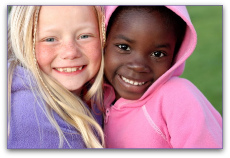
Although a toddler at age 2 looks, acts and thinks much differently than a 12-year-old, both occupy the same 10-year span that developmental psychology professionals label the “child developmental stage.”
To breakdown the study of this broad category, developmentalists typically emphasize two general age groups: 1.) Early childhood, focusing on children ages 2 to 6. And, 2.) School-aged children, focusing on children ages 6 to 12.
Professionals in this field research and study pivotal areas of development including motor development, cognitive changes, language acquisition, emotional maturity and social interactions.
Early Childhood Years
The early childhood years are also called the preschool years, and more appropriately the “play years.” While humans at all ages play, it is during early childhood that play consumes most of a child’s waking hours. Developmentalists understand that play actually influences growth and change in all the pivotal developmental areas. By age 5, a children’s physical development and large motor skills permit them to run and chase each other, and play independently – and with others – on playground equipment. According to a developmental theory called sociocultural theory, children learn these large motor skills better from peers than from adult instruction, making play with other children especially important.
It’s also during early childhood that neurological changes in the brain influence the learning of language. And because children at this stage are not afraid to make verbal mistakes when talking, and they desperately want to communicate, their free use of language without fear of embarrassment greatly aids in the development of their vocabulary, grammar acquisition and pronunciation abilities.
Cognitive growth is nurtured by imaginative play and creative activities in conjunction with rapid neurological changes. Between the ages of 3 and 5, children develop “theory of mind,” or the comprehension that other people think differently from them, and that others’ thoughts can be misleading or even wrong. Additionally, children between the ages of 2 and 6 learn to regulate their emotions by controlling impulses that stem from anger or fear. For example, a 2-year-old will kick and scream and throw a temper tantrum, but by the time this child turns 5, the child has learned how to better control anger, and manage this emotion more constructively. Similarly, the child at 2 will cling to caregivers or parents in fear of separation, but by the age of 5 or 6, most children separate with few problems.
Developmentalists also credit play in providing the most important mechanism for children in this age group to learn social interaction skills. By age 5, most children successfully play in groups, handle conflict and select someone as a special playmate.
School-Age Children
Regardless of the psychological theory or research used to describe the maturation of children ages 7 to 11, all developmentalists agree that children in this age group are eager, competent, and ready to explore wider social networks. Continued neurological changes affect both cognitive and motor abilities, which, psychologists say, are inextricably interconnected.
Motor skills improve dramatically during this time period due partly to a significant increase in physical reaction times. Neurological changes also translate into improved fine motor skills as in eye-hand coordination abilities, balance and well-coordinated movements. Many developmentalists continue to emphasize play during this stage, nurtured through sports, time at the playground, and neighborhood activities, asserting that physical movement greatly influences learning and growth, and affects emotional maturity as well.
Just as neurology improves reaction times and coordination for kids in this age group, it also increases logic and reasoning skills, and facilitates advanced knowledge of language. Children are quick learners at this age, able to absorb and store large amounts of information, and to rapidly access this stored information. They memorize lyrics, play advanced computer games, play musical instruments, and write meaningful stories and poems.
One cognitive skill developed during this time period that influences these types of advanced abilities stems from the development of “metacognition,” or the ability to “think about thinking.” Children who have developed metacognition are able to analyze tasks, develop a plan on how to approach and solve them, and then evaluate themselves on how they accomplished the tasks.
Friendships become increasingly important for children between the ages of 7 and 11, and these friendships aid social learning. Children begin to think more deeply about their social contexts and their relation to these contexts, and they compare themselves to others to define themselves. Generally, a child at age 11 or 12 is much better at controlling and understanding their emotions than a child at age 5 or 6.
However, children who feel neglected by peers can become aggressive or withdrawn. And bullies can cause emotional damage not only to their victims, but themselves as well. Psychologists point to the support of close family relationships as helping children cope with tough social situations. Even children from war-plagued countries and extreme poverty seem to weather stresses better if they have the support of at least one parent.
Understanding developmental psychology principles for children contributes to educational curriculum development, and provides a knowledge base for health care workers diagnosing and recommending interventions for those children not meeting milestones. Professionals specializing in developmental psychology of childhood also influence public policy to create laws and programs beneficial for positive growth and development during childhood.
If you are interested in issues in the developmental psychology of childhood, you should consider a degree in developmental psychology. If you want to conduct research in areas related to children ages 2 to 11, you should consider an academic career. Universities require at least a master’s degree to teach, but most require a PhD in Psychology. Positions in health care and for nonprofit agencies usually require a master’s degree. Day care and preschools often hire those with a bachelor’s degree in psychology.